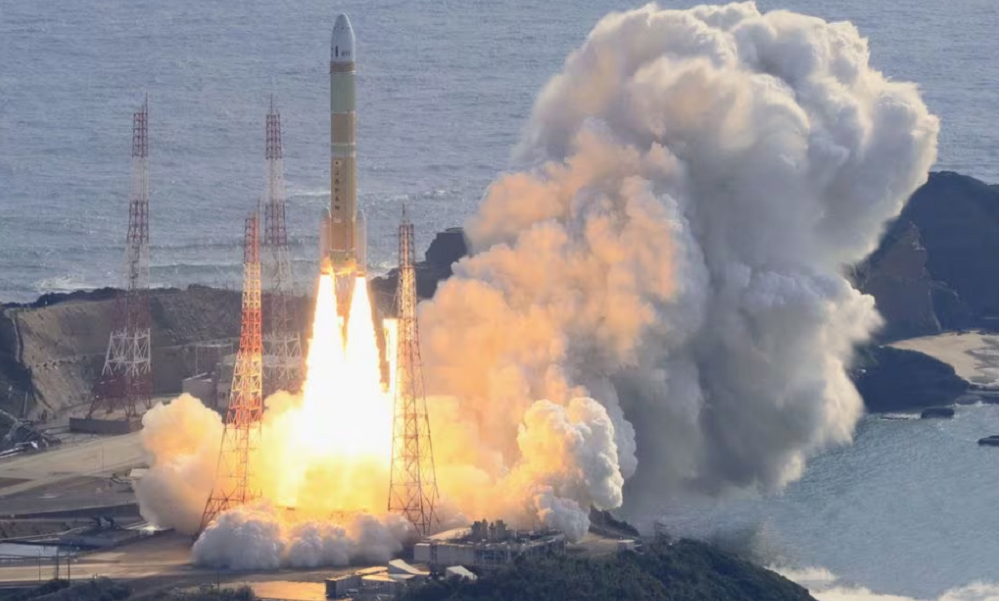Science & Technology
Japan successfully launches next-generation H3 rocket after failure last year

Japan successfully launched its new H3 flagship rocket on Saturday, putting its space programme back on track after multiple setbacks including the failure of the rocket’s inaugural flight last year.
The launch also marks a second straight win for the Japan Aerospace Exploration Agency (JAXA) after its lunar lander, SLIM, achieved a “pinpoint” touchdown last month and made Japan only the fifth country to put a spacecraft on the moon, Reuters reported.
A relatively small player in space by number of launches, Japan is seeking to revitalise its programme as it partners with ally the United States to counter China.
The H3 lifted off at 9:22 a.m. local time (0022 GMT) and after it successfully released a small satellite, jubilant scientists at the Tanegashima Space Center in southern Japan clapped, yelled and hugged each other.
The rocket also released a microsatellite and a dummy satellite during its flight of nearly two hours.
“The newborn H3 has just made its first cry”, JAXA project manager Masashi Okada, who has led the decade-long development of the new rocket, told a news conference.
“And we need to start preparing for the third H3 launch as soon as tomorrow.”
The H3 is due to replace the two-decade-old H-IIA, which is retiring after two more launches. Another failed flight would have seen Japan face the prospect of losing independent access to space.
The first launch in March ended up with ground control destroying the rocket 14 minutes after liftoff when the second-stage engine failed to ignite. JAXA listed three possible electrical faults in a review released in October but could not identify the direct cause.
Five months earlier, JAXA’s small rocket Epsilon had also failed to launch.
“So happy to see this incredible accomplishment in the space sector that follows on from the success of the SLIM moon landing,” Prime Minister Fumio Kishida said in a post on X.
The 63 m (297 ft) H3 is designed to carry a 6.5 metric ton payload and over the long-term, the agency wants to reduce per-launch cost to as low as five billion yen ($33 million) – half of what an H-IIA launch costs – by adopting simpler structures and automotive-grade electronics.
JAXA and primary contractor Mitsubishi Heavy Industries (7011.T), opens new tab hope those features will help them win launch orders from global clients.
“It’s taken some time for the program to get to this point but with this launch, they will be fielding inquiries from around the world,” said Ko Ogasawara, a professor at the Tokyo University of Science.
The Japanese government plans to launch about 20 satellites and probes with H3 rockets by 2030 for domestic use. The H3 is scheduled to deliver a lunar explorer for the joint Japan-India LUPEX project in 2025 as well as cargo spacecraft for the U.S.-led Artemis moon exploration program in the future.
Satellite launch demands have skyrocketed thanks to the rise of affordable commercial vehicles such as SpaceX’s reusable Falcon 9 and a number of new rockets are being tested this year.
Last month marked the successful inaugural flight of the United Launch Alliance’s Vulcan rocket, a joint venture between Boeing (BA.N), opens new tab and Lockheed Martin (LMT.N), opens new tab. The European Space Agency also plans to launch its lower-cost Ariane 6 for the first time this year.
Masayuki Eguchi, the head of Mitsubishi Heavy’s defence and space business, said the company has a long-term target of launching eight to ten rockets a year, which would boost its 50 billion yen space business sales by 20-30%.
That would require additional production capacity, he added, noting the company’s factories can currently only produce five to six H3 rockets a year.
Science & Technology
Australia social media ban set to take effect, sparking a global crackdown
For the social media businesses, the implementation marks a new era of structural stagnation as user numbers flatline and time spent on platforms shrinks, studies show.

Australia is set to become the first country to implement a minimum age for social media use on Wednesday, with platforms like Instagram, TikTok and YouTube forced to block more than a million accounts, marking the beginning of an expected global wave of regulation.
From midnight, 10 of the biggest platforms will be required to block Australians aged under 16 or be fined up to A$49.5 million ($33 million), Reuters reported.
The law received harsh criticism from major technology companies and free speech advocates, but was praised by parents and child advocates.
The rollout closes out a year of speculation about whether a country can block children from using technology that is built into modern life. And it begins a live experiment that will be studied globally by lawmakers who want to intervene directly because they are frustrated by what they say is a tech industry that has been too slow to implement effective harm-minimisation efforts.
Governments from Denmark to Malaysia – and even some states in the U.S., where platforms are rolling back trust and safety features – say they plan similar steps, four years after a leak of internal Meta (META.O) documents showed the company knew its products contributed to body image problems and suicidal thoughts among teenagers while publicly denying the link existed.
“While Australia is the first to adopt such restrictions, it is unlikely to be the last,” said Tama Leaver, a professor of internet studies at Curtin University.
“Governments around the world are watching how the power of Big Tech was successfully taken on. The social media ban in Australia … is very much the canary in the coal mine.”
A spokesperson for the British government, which in July began forcing websites hosting pornographic content to block under-18 users, said it was “closely monitoring Australia’s approach to age restrictions.”
“When it comes to children’s safety, nothing is off the table,” they added.
Few will scrutinise the impact as closely as the Australians. The eSafety Commissioner, an Australian regulator tasked with enforcing the ban, hired Stanford University and 11 academics to analyse data on thousands of young Australians covered by the ban for at least two years.
Though the ban covers 10 platforms initially, including Alphabet’s (GOOGL.O), YouTube, Meta’s Instagram and TikTok, the government has said the list will change as new products appear and young users switch to alternatives.
Of the initial 10, all but Elon Musk’s X have said they will comply using age inference – guessing a person’s age from their online activity – or age estimation, which is usually based on a selfie. They might also check with uploaded identification documents or linked bank account details.
Musk has said the ban “seems like a backdoor way to control access to the internet by all Australians” and most platforms have complained that it violates people’s right to free speech.
For the social media businesses, the implementation marks a new era of structural stagnation as user numbers flatline and time spent on platforms shrinks, studies show.
Platforms say they don’t make much money showing advertisements to under-16s, but they add that the ban interrupts a pipeline of future users. Just before the ban took effect, 86% of Australians aged 8 to 15 used social media, the government said.
“The days of social media being seen as a platform for unbridled self-expression, I think, are coming to an end,” said Terry Flew, the co-director of University of Sydney’s Centre for AI, Trust and Governance.
Platforms responded to negative headlines and regulatory threats with measures like a minimum age of 13 and extra privacy features for teenagers, but “if that had been the structure of social media in the boom period, I don’t think we’d be having this debate,” he added.
Science & Technology
Ethiopian volcano erupts for first time in nearly 12,000 years
Ash from the eruption drifted across the region, spreading over Yemen, Oman, India, and parts of Pakistan.

The Hayli Gubbi volcano in Ethiopia’s Afar region has erupted for the first time in almost 12,000 years, sending massive ash plumes soaring up to 14 kilometres into the atmosphere, according to the Toulouse Volcanic Ash Advisory Centre.
The eruption began on Sunday and lasted several hours. Hayli Gubbi, located around 800 kilometres northeast of Addis Ababa near the Eritrean border, sits within the geologically active Rift Valley, where two major tectonic plates meet. The volcano rises roughly 500 metres above the surrounding landscape.
Ash from the eruption drifted across the region, spreading over Yemen, Oman, India, and parts of Pakistan. Satellite imagery and social-media videos captured a towering column of white smoke billowing into the sky.
The Smithsonian Institution’s Global Volcanism Program notes that Hayli Gubbi has no recorded eruptions during the Holocene, the period dating back about 12,000 years to the end of the last Ice Age.
Volcanologist Simon Carn of Michigan Technological University also confirmed on Bluesky that the volcano had “no record of Holocene eruptions.”
Science & Technology
Cloudflare outage easing after millions of internet users affected

A global outage at web-infrastructure firm Cloudflare began to ease on Tuesday afternoon after preventing people from accessing major internet platforms, including X and ChatGPT.
Cloudflare, whose network handles around a fifth of web traffic, said it started to investigate the internal service degradation around 6:40 a.m. ET. It has deployed a fix but some customers might still be impacted as it recovers service.
The incident marked the latest hit to major online services. An outage of Amazon’s cloud service last month caused global turmoil as thousands of popular websites and apps, including Snapchat, were inaccessible due to the disruption.
Cloudflare – whose shares were down about 5% in premarket trading – runs one of the world’s largest networks that helps websites and apps load faster and stay online by protecting them from traffic surges and cyberattacks.
The latest outage prevented users from accessing platforms such as Canva, X, and ChatGPT, prompting users to log outage reports with Downdetector.
Downdetector tracks outages by collating status reports from a number of sources. “We saw a spike in unusual traffic to one of Cloudflare’s services beginning at 11:20 UTC. That caused some traffic passing through Cloudflare’s network to experience errors,” the company said in an emailed statement.
“We are all hands on deck to make sure all traffic is served without errors.”
X and ChatGPT-creator OpenAI did not immediately respond to requests for comment. – REUTERS
-

 Latest News3 days ago
Latest News3 days agoAfghan border forces prevent illegal entry of hundreds into Iran
-

 Latest News3 days ago
Latest News3 days agoPakistan summons Afghan diplomat over deadly attack in North Waziristan
-

 Latest News2 days ago
Latest News2 days agoAfghan health minister calls for medical cooperation between Kabul and New Delhi
-

 Latest News1 day ago
Latest News1 day agoAfghanistan signs 30-year deal for marble mining in Daikundi
-

 Latest News3 days ago
Latest News3 days agoJapan allocates nearly $20 million in humanitarian aid for Afghanistan
-

 Latest News3 days ago
Latest News3 days agoKarzai urges reopening of girls’ schools and universities for Afghanistan’s bright future
-

 Health5 days ago
Health5 days agoAfghanistan seeks India’s support in standardizing traditional medicine
-

 World5 days ago
World5 days agoUS readies new Russia sanctions if Putin rejects peace deal, Bloomberg News reports
























